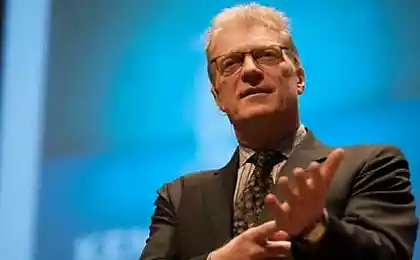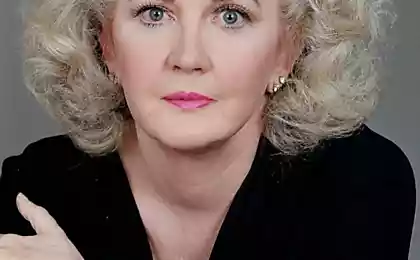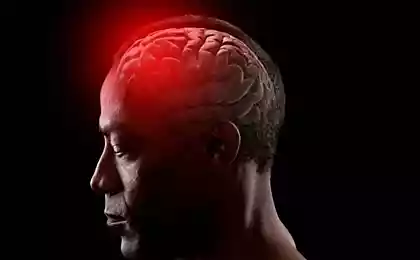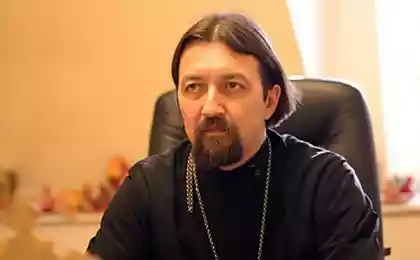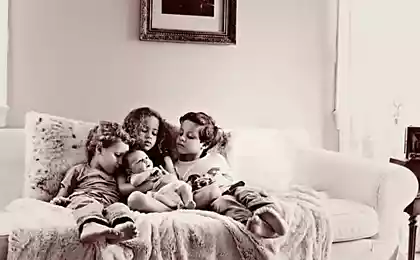571
Ken Robinson: We are educating children from creativity
Sir Ken Robinson's funny and convincingly supports the proposal to create an educational system aimed at development, not the suppression of creativity.
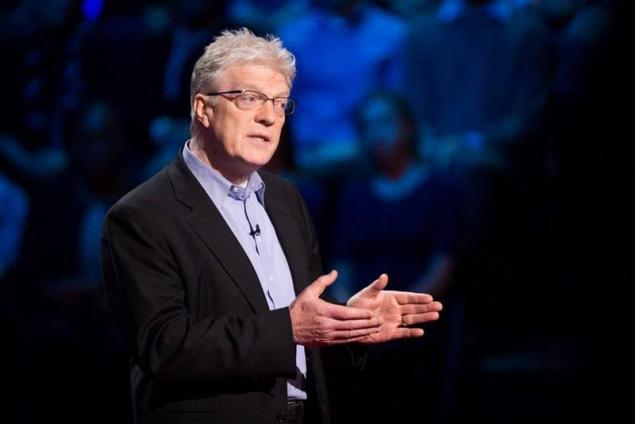
0:13 Good morning! How's it going?
0:15 (Laughter)
0:16 do You like the conference? Previous statement struck me to the core, so I think I'll go.
0:23 (Laughter)
https://embed.ted.com/talks/lang/ru/ken_robinson_says_schools_kill_creativity
0:29 during the conference, I watched three themes that are important to my statement. First, each lecture and each speaker showed an example of human creativity — the amazing breadth and diversity. Second, we realized that we really don't know what will be our future. Don't have a clue.
0:56 I'm interested in education; frankly, I think that education interesting for all. Don't you think? It's quite interesting: here you are at a party and reported that work in education. Actually, you're not often at dinner parties,
1:11 (Laughter)
1:15 of educators are not invited.
1:18 (Laughter)
1:2 1Любопытно not inviting, even if you. But let you at the party, and ask you about your profession. You respond that you are a teacher, and money and other things. "God, this is making me do that?"
1:35 (Laughter)
1:37 "the Only time broke in a week."
1:38 (Laughter)
1:41 But if you ask about his education, he will be insulted. This question is considered rude, too personal, right? How religion, money and other things. I am very interested in education, I guess. This topic is so close to us, partly because it is education that must be the door to the future we imagined. If you think about it, arrived this year in school children will retire in 2065. Despite all that we heard during these four days, nobody has a clue about how the world works at least five years. However, our task is to prepare children to him. So the unpredictability, I predict.
2:23 And third, we all I think agree that children are capable of quite extraordinary things, capable of inventing a new one. Yesterday we saw the Syrian — her extraordinary ability. They are simply amazing. She is exceptional, but in a sense, and mediocre if you compare it with all the children in the world. In it we see a person of extraordinary dedication who found a talent. I believe that such talents are there for all children, and we squander them, pretty ruthlessly.
2:56 I'd like to talk about education and creativity. It seems to me that creativity is now as important as literacy and we should treat creativity with the corresponding status.
3:09 (Applause) Thank You.
3:11 (Applause)
3:16 That's all, by the way. Thank you for your attention.
3:18 (Laughter)
3:20 So, 15 minutes left.
3:23 (Laughter)
3:25Ну, I was born... no.
3:27 (Laughter)
3:30 I love to tell a story. Six-year-old girl sat in the back row in art class, and something painted. Girl at all has not paid attention to the lesson, but then it worked very enthusiastically. The teacher was interested, approached the girl and asked, "What are you drawing?" The girl said, "I paint the portrait of God". The teacher said, "But nobody knows what God looks like" and the girl said, "Now learn".
3:56 (Laughter)
4:07 When my son was in England four years... to be Honest, he was four everywhere.
4:12 (Laughter)
4:14 Strictly speaking, in that year, no matter where he was, he was four years old. He played in the Nativity play. You remember the story?
4:20 (Laughter)
4:21 That was a blockbuster! Mel Gibson did the sequel, you've probably seen:
4:25 (Laughter)
4:27 "Christmas-2". James got the part of Joseph, we were very happy. We then thought that this is one of the main roles. We have hired special people in t-shirts: "James Robinson is Joseph!" (Laughter) plays without words, but remember the bit where the three wise men. They come bearing gifts and they bring gold, frankincense and myrrh. Real case. We sat in the hall, and Magi seem to have mixed up the gifts; after the show, we asked one of the boys if all went well, and he was surprised by the question. They just waved. Came three boys with towels on their heads, and four-year-olds, put on the floor of the box, the first one says: "I bring you gold", the second says: "I bring you myrrh" and the third says: "I brought... well, here!"
5:09 (Laughter)
5:21 In both stories have something in common — children are able to take risks; if they are not sure about something, they still try. Dear friends, am I wrong? They are not afraid to make a mistake. I'm certainly not saying that doing wrong is the same, but we know that those who are not willing to be wrong, not able to do, can not think of original. You need to be able to make a mistake. But when the children grow up, most lose this ability, they become afraid to make mistakes. Similarly, we manage companies. We do not forgive mistakes. Yes, and our public education system is built on intolerance towards errors. As a result, we are educating people out of creativity.
6:05 Picasso Once said all children are born artists. The problem is how to remain an artist as we grow up. I am sure that we do not develop creativity, growing up, but rather grow from them. Or rather, we get educated out if it. Why is this happening?
6:22 About five years ago I lived in Stratford-on-Avon — we moved from Stratford to Los Angeles. And, of course, immediately felt like home.
6:31 (Laughter)
6:33 actually, we lived in a place called snitterfield, near Stratford. There's father was born. Surprised? I was surprised. Somehow I don't think that Shakespeare was the father, right? Really? You never thought that Shakespeare was once a child! Shakespeare Being Seven? I had no idea that he was once seven years old and someone taught him English!
6:54 (Laughter)
7:01 Imagine what confusion?
7:03 (Laughter)
7:10 "try a Little".
7:11 (Laughter)
7:15 Dad drove him in the bed, his Shakespeare! "Well, go to bed! And put down the pencil."
7:21 (Laughter)
7:22 "And stop speaking like that".
7:24 (Laughter)
7:28 "nobody understands!"
7:29 (Laughter)
7:34 so we moved from Stratford to Los Angeles, and I just want to tell you about moving. My son didn't want to go with us. I have two children. He's 21 now; my daughter's 16, and he didn't want to go to Los Angeles. He loved it, but in England he was a girl. The love of his life, Sara, they had known each other for a month.
7:57 (Laughter)
7:58 They even noted its fourth anniversary, because it's a lot when you are 16 years old.The whole way he was very upset, saying that she will never find a girl like Sarah. To be honest, we were rather pleased about that,
8:10 (Laughter)
8:18 as we decided to leave in the first place because of her.
8:21 (Laughter)
8:27 But when I move to America or traveling the world, notice one thing — in terms of a hierarchy of subjects, all educational systems are identical. All, without exception. It seems that there must be differences, but they are not. At the top are mathematics and languages, then the Humanities, and then arts, and so — on Earth. Among the creative items also have their own hierarchy. Art and music take precedence over the drama and dance. There isn't an education system in which the dances were taught like math, every day. Why? Why not? I think it's important. Math is important and so are the dances. Children begin to dance at the first opportunity. We all have hands and feet, or have I missed something?
9:10 (Laughter)
9:13 Here's what happens: as the children grow, we begin to form them, moving up from the waist before settling on his head, or rather her left side.
9:22 If you look at the state education through the eyes of a alien and to ask: what is its purpose, then, looking at the results for those who succeed, on people, on children, does what's expected of them, you as a foreigner would come to the conclusion that the purpose of public education systems around the world is to produce University professors. Isn't it? That's who you're after. And I was one of them, so it is!
9:48 (Laughter)
9:51 I have nothing against professors, but we should not think that these people — the value of human achievement. They are just a special kind, another form of life. I must say weird — I say this with love. Most I met professors, not all, but most, they live in their heads — up there, mostly on the left side. They are ethereal, almost literally. They consider the body as a means of transport for their heads.
10:21 (Laughter)
10:27 Agree? Body for them is a way of getting their head to meetings.
10:30 (Laughter)
10:36 If you need proof that existence outside the body may go to a conference of senior academics and go to the dance last night.
10:45 (Laughter)
10:48 You will see how grown men and women writhing uncontrollably, off the rhythm,
10:54 (Laughter)
10:56 waiting for the end of the dance to go home and write an article about them.
11:00 (Laughter)
11:02 of Ideal our educational system is a scientist, and with good reason. Public education was built in the XIX century. They were tailored to the needs of the industrial revolution. The hierarchy is rooted on two pillars.
11:18 First: priority disciplines, useful for finding work. In school you are probably mildly distracted by interesting objects and classes, because you could never make them your profession. "Don't do music, you're not going to be a musician; come on drawing, you're not an artist". Good advice, but, alas, incorrect. Our world is engulfed in revolution.
11:41 Second: the case in science, which has become our view of intelligence because the universities designed the system for themselves. If you think about it, the public educational system in the world is a protracted process of University entrance. As a result of very talented people who don't consider themselves as such, because one never cherishes their favorite school subjects. But, I think, can not continue.
12:06 In the next 30 years, according to UNESCO, the universities will release more people than in the entire history of mankind. All of this is a combination of factors, which we discussed earlier: the impact of technology on work, tremendous growth.
12:23 Diploma suddenly depreciated. . Don't you? When I was a student, if you had a degree, you had a job, but if not, it's because you didn't want to work, and I, frankly, did not want to work. (Laughter) Now the students after graduation go back home to play video games, after all, where it previously lacked a bachelor's degree now require a master's degree, and in its place need a PhD. This inflation of education — a sign that the whole structure of education is shifting beneath our feet. We need to radically rethink our view of intelligence.
12:56 We know about the mind three things: first, it's diverse. We think the same way as perceived, that is, the visual images, sounds and tactile sensations; we think in abstract terms, think in movement. Secondly, intelligence is dynamic. As we learned yesterday from a number of presentations, according to the exchange of information within the brain, intelligence is wonderfully interactive, the brain isn't divided into compartments. In fact, creativity -- which I define as the process of emergence of new critical ideas, arise from the interaction of different disciplinary ways of knowing the world.
13:33 by the Way, there is a ganglion, which unites the two hemispheres of the brain, called the corpus callosum. It's thicker in women. Picking up the baton from Helen to assume that this is why women are better at several things at once. There is a lot of research, but I know it for myself: if my wife is cooking a meal at home, fortunately, is rare...
13:56 (Laughter)
13:58 No, she succeeds in many ways, but cooking meals, she is simultaneously talking on the phone, talking to the kids, she's painting the ceiling makes the open heart surgery. When I'm cooking, the door is shut, the kids are out, the phone is silent. If she comes, I'm angry. I tell her, "Terry, I'm actually trying to fry an egg".
14:18 (Laughter)
14:25 "don't distract me."
14:26 (Laughter)
14:28 You know that old saying: if no one heard the tree fall, did it really? Remember that old chestnut? I recently saw a great t-shirt that says: "If a man speaks in the forest and no hears, no woman, is he still wrong?"
14:43 (Laughter)
14:50 And the third thing I want to say about the mind. Each has his own. I'm working on a new book called "Revelation". It is based on a series of interviews on how people discovered his talent. I'm amazed at how people pass this way. The book I pushed the conversation with a wonderful woman that many have never heard of, her name is Gillian Lin. Have you heard of her? Some of you are. She's a choreographer and everyone knows her creations. She put the musicals "Cats" and "phantom of the Opera". She's gorgeous. In England I was in the Royal ballet, that is obvious. One day over lunch I asked Jillian, as she began to dance. It's an interesting story. She said that in school she was really hopeless. It was in the 1930s, her parents wrote the school that the girl had a learning problem. She couldn't concentrate; she was fidgeting. Now would say she had attention deficit disorder.But in the 1930-ies, this syndrome had not been invented, the disease was then unavailable.
15:46 (Laughter)
15:48 no One knew that there was this type of disorder.
15:50 (Laughter)
15:53 So, they took her to the doctor. Room, separate oak panels, she came there with her mother, she was put in a chair at the far end of the room where she sat, placing her hands under legs for twenty minutes until the doctor talked about her problems in school. It was disturbing, no time to homework in eight years. In the end, the doctor sat next to Gillian and told her that after hearing her mother about all the problems, need to talk to the one on one. He asked Gillian to wait a little bit and walked out with her.
16:26 Before leaving, he turned on the table radio. As soon as the adults left, the doctor asked mum Gillian to look at her. She immediately jumped to his feet and moved to the beat of the music. They watched for a few minutes, then the doctor turned and said,"Mrs. Lynne, Gillian isn't sick. She's a dancer. Take her to a dance school."
16:50 I asked what happened next. She said, "Mom followed his advice and it was perfect.We entered the room, which was similar to me — no one could sit still. People who to think, you had to move." They studied ballet, tap, jazz, modern and contemporary dance. She was eventually auditioned for the Royal ballet school, she became a soloist, had a distinguished career in the Royal ballet. In the end, she graduated from the Royal ballet school, founded a Dance company Jillian Lin, met Andrew Lloyd Webber. Gillian made one of the most successful musical theater productions in history, has brought joy to millions of people and became a multimillionaire. But another doctor could put her on the pill and getting him to calm down.
17:32 (Applause)
17:39 I guess it boils down to. Al Gore recently gave a lecture about ecology and the revolution that was triggered by Rachel Carson. I guess our only hope for the future is to adopt a new conception of human ecology, one in which we start rethinking the richness of human capacity. Our educational system has mined our minds as we strip the Earth for a particular commodity. But we can't use the system any further. We have to rethink the basic principles of educating our children.
18:13 Jonas Salk once said, "If all the insects were to disappear from Earth, within 50 years all life on earth will become lifeless. If all human beings disappeared from Earth, within 50 years all forms of life would flourish". And he's right.
Robert Waldinger: Happiness — a study of the life-longAddictive licciana TED Michael Pollan: look at the world from the point of view of plants
18:33 TED is a tribute to human imagination. We must try to wisely use this gift in order to avoid the development of events, which was discussed. The only way for us to appreciate the diversity of our creative abilities and to appreciate our children because they are our hope. We need to teach them holistically, to cope with the future, which, I note, we may not see this future, but they will. And we should help them make something of it.
19:04 Thank you for your attention.
19:05 (Applause).published
Source: www.ted.com/talks/ken_robinson_says_schools_kill_creativity?language=ru

0:13 Good morning! How's it going?
0:15 (Laughter)
0:16 do You like the conference? Previous statement struck me to the core, so I think I'll go.
0:23 (Laughter)
https://embed.ted.com/talks/lang/ru/ken_robinson_says_schools_kill_creativity
0:29 during the conference, I watched three themes that are important to my statement. First, each lecture and each speaker showed an example of human creativity — the amazing breadth and diversity. Second, we realized that we really don't know what will be our future. Don't have a clue.
0:56 I'm interested in education; frankly, I think that education interesting for all. Don't you think? It's quite interesting: here you are at a party and reported that work in education. Actually, you're not often at dinner parties,
1:11 (Laughter)
1:15 of educators are not invited.
1:18 (Laughter)
1:2 1Любопытно not inviting, even if you. But let you at the party, and ask you about your profession. You respond that you are a teacher, and money and other things. "God, this is making me do that?"
1:35 (Laughter)
1:37 "the Only time broke in a week."
1:38 (Laughter)
1:41 But if you ask about his education, he will be insulted. This question is considered rude, too personal, right? How religion, money and other things. I am very interested in education, I guess. This topic is so close to us, partly because it is education that must be the door to the future we imagined. If you think about it, arrived this year in school children will retire in 2065. Despite all that we heard during these four days, nobody has a clue about how the world works at least five years. However, our task is to prepare children to him. So the unpredictability, I predict.
2:23 And third, we all I think agree that children are capable of quite extraordinary things, capable of inventing a new one. Yesterday we saw the Syrian — her extraordinary ability. They are simply amazing. She is exceptional, but in a sense, and mediocre if you compare it with all the children in the world. In it we see a person of extraordinary dedication who found a talent. I believe that such talents are there for all children, and we squander them, pretty ruthlessly.
2:56 I'd like to talk about education and creativity. It seems to me that creativity is now as important as literacy and we should treat creativity with the corresponding status.
3:09 (Applause) Thank You.
3:11 (Applause)
3:16 That's all, by the way. Thank you for your attention.
3:18 (Laughter)
3:20 So, 15 minutes left.
3:23 (Laughter)
3:25Ну, I was born... no.
3:27 (Laughter)
3:30 I love to tell a story. Six-year-old girl sat in the back row in art class, and something painted. Girl at all has not paid attention to the lesson, but then it worked very enthusiastically. The teacher was interested, approached the girl and asked, "What are you drawing?" The girl said, "I paint the portrait of God". The teacher said, "But nobody knows what God looks like" and the girl said, "Now learn".
3:56 (Laughter)
4:07 When my son was in England four years... to be Honest, he was four everywhere.
4:12 (Laughter)
4:14 Strictly speaking, in that year, no matter where he was, he was four years old. He played in the Nativity play. You remember the story?
4:20 (Laughter)
4:21 That was a blockbuster! Mel Gibson did the sequel, you've probably seen:
4:25 (Laughter)
4:27 "Christmas-2". James got the part of Joseph, we were very happy. We then thought that this is one of the main roles. We have hired special people in t-shirts: "James Robinson is Joseph!" (Laughter) plays without words, but remember the bit where the three wise men. They come bearing gifts and they bring gold, frankincense and myrrh. Real case. We sat in the hall, and Magi seem to have mixed up the gifts; after the show, we asked one of the boys if all went well, and he was surprised by the question. They just waved. Came three boys with towels on their heads, and four-year-olds, put on the floor of the box, the first one says: "I bring you gold", the second says: "I bring you myrrh" and the third says: "I brought... well, here!"
5:09 (Laughter)
5:21 In both stories have something in common — children are able to take risks; if they are not sure about something, they still try. Dear friends, am I wrong? They are not afraid to make a mistake. I'm certainly not saying that doing wrong is the same, but we know that those who are not willing to be wrong, not able to do, can not think of original. You need to be able to make a mistake. But when the children grow up, most lose this ability, they become afraid to make mistakes. Similarly, we manage companies. We do not forgive mistakes. Yes, and our public education system is built on intolerance towards errors. As a result, we are educating people out of creativity.
6:05 Picasso Once said all children are born artists. The problem is how to remain an artist as we grow up. I am sure that we do not develop creativity, growing up, but rather grow from them. Or rather, we get educated out if it. Why is this happening?
6:22 About five years ago I lived in Stratford-on-Avon — we moved from Stratford to Los Angeles. And, of course, immediately felt like home.
6:31 (Laughter)
6:33 actually, we lived in a place called snitterfield, near Stratford. There's father was born. Surprised? I was surprised. Somehow I don't think that Shakespeare was the father, right? Really? You never thought that Shakespeare was once a child! Shakespeare Being Seven? I had no idea that he was once seven years old and someone taught him English!
6:54 (Laughter)
7:01 Imagine what confusion?
7:03 (Laughter)
7:10 "try a Little".
7:11 (Laughter)
7:15 Dad drove him in the bed, his Shakespeare! "Well, go to bed! And put down the pencil."
7:21 (Laughter)
7:22 "And stop speaking like that".
7:24 (Laughter)
7:28 "nobody understands!"
7:29 (Laughter)
7:34 so we moved from Stratford to Los Angeles, and I just want to tell you about moving. My son didn't want to go with us. I have two children. He's 21 now; my daughter's 16, and he didn't want to go to Los Angeles. He loved it, but in England he was a girl. The love of his life, Sara, they had known each other for a month.
7:57 (Laughter)
7:58 They even noted its fourth anniversary, because it's a lot when you are 16 years old.The whole way he was very upset, saying that she will never find a girl like Sarah. To be honest, we were rather pleased about that,
8:10 (Laughter)
8:18 as we decided to leave in the first place because of her.
8:21 (Laughter)
8:27 But when I move to America or traveling the world, notice one thing — in terms of a hierarchy of subjects, all educational systems are identical. All, without exception. It seems that there must be differences, but they are not. At the top are mathematics and languages, then the Humanities, and then arts, and so — on Earth. Among the creative items also have their own hierarchy. Art and music take precedence over the drama and dance. There isn't an education system in which the dances were taught like math, every day. Why? Why not? I think it's important. Math is important and so are the dances. Children begin to dance at the first opportunity. We all have hands and feet, or have I missed something?
9:10 (Laughter)
9:13 Here's what happens: as the children grow, we begin to form them, moving up from the waist before settling on his head, or rather her left side.
9:22 If you look at the state education through the eyes of a alien and to ask: what is its purpose, then, looking at the results for those who succeed, on people, on children, does what's expected of them, you as a foreigner would come to the conclusion that the purpose of public education systems around the world is to produce University professors. Isn't it? That's who you're after. And I was one of them, so it is!
9:48 (Laughter)
9:51 I have nothing against professors, but we should not think that these people — the value of human achievement. They are just a special kind, another form of life. I must say weird — I say this with love. Most I met professors, not all, but most, they live in their heads — up there, mostly on the left side. They are ethereal, almost literally. They consider the body as a means of transport for their heads.
10:21 (Laughter)
10:27 Agree? Body for them is a way of getting their head to meetings.
10:30 (Laughter)
10:36 If you need proof that existence outside the body may go to a conference of senior academics and go to the dance last night.
10:45 (Laughter)
10:48 You will see how grown men and women writhing uncontrollably, off the rhythm,
10:54 (Laughter)
10:56 waiting for the end of the dance to go home and write an article about them.
11:00 (Laughter)
11:02 of Ideal our educational system is a scientist, and with good reason. Public education was built in the XIX century. They were tailored to the needs of the industrial revolution. The hierarchy is rooted on two pillars.
11:18 First: priority disciplines, useful for finding work. In school you are probably mildly distracted by interesting objects and classes, because you could never make them your profession. "Don't do music, you're not going to be a musician; come on drawing, you're not an artist". Good advice, but, alas, incorrect. Our world is engulfed in revolution.
11:41 Second: the case in science, which has become our view of intelligence because the universities designed the system for themselves. If you think about it, the public educational system in the world is a protracted process of University entrance. As a result of very talented people who don't consider themselves as such, because one never cherishes their favorite school subjects. But, I think, can not continue.
12:06 In the next 30 years, according to UNESCO, the universities will release more people than in the entire history of mankind. All of this is a combination of factors, which we discussed earlier: the impact of technology on work, tremendous growth.
12:23 Diploma suddenly depreciated. . Don't you? When I was a student, if you had a degree, you had a job, but if not, it's because you didn't want to work, and I, frankly, did not want to work. (Laughter) Now the students after graduation go back home to play video games, after all, where it previously lacked a bachelor's degree now require a master's degree, and in its place need a PhD. This inflation of education — a sign that the whole structure of education is shifting beneath our feet. We need to radically rethink our view of intelligence.
12:56 We know about the mind three things: first, it's diverse. We think the same way as perceived, that is, the visual images, sounds and tactile sensations; we think in abstract terms, think in movement. Secondly, intelligence is dynamic. As we learned yesterday from a number of presentations, according to the exchange of information within the brain, intelligence is wonderfully interactive, the brain isn't divided into compartments. In fact, creativity -- which I define as the process of emergence of new critical ideas, arise from the interaction of different disciplinary ways of knowing the world.
13:33 by the Way, there is a ganglion, which unites the two hemispheres of the brain, called the corpus callosum. It's thicker in women. Picking up the baton from Helen to assume that this is why women are better at several things at once. There is a lot of research, but I know it for myself: if my wife is cooking a meal at home, fortunately, is rare...
13:56 (Laughter)
13:58 No, she succeeds in many ways, but cooking meals, she is simultaneously talking on the phone, talking to the kids, she's painting the ceiling makes the open heart surgery. When I'm cooking, the door is shut, the kids are out, the phone is silent. If she comes, I'm angry. I tell her, "Terry, I'm actually trying to fry an egg".
14:18 (Laughter)
14:25 "don't distract me."
14:26 (Laughter)
14:28 You know that old saying: if no one heard the tree fall, did it really? Remember that old chestnut? I recently saw a great t-shirt that says: "If a man speaks in the forest and no hears, no woman, is he still wrong?"
14:43 (Laughter)
14:50 And the third thing I want to say about the mind. Each has his own. I'm working on a new book called "Revelation". It is based on a series of interviews on how people discovered his talent. I'm amazed at how people pass this way. The book I pushed the conversation with a wonderful woman that many have never heard of, her name is Gillian Lin. Have you heard of her? Some of you are. She's a choreographer and everyone knows her creations. She put the musicals "Cats" and "phantom of the Opera". She's gorgeous. In England I was in the Royal ballet, that is obvious. One day over lunch I asked Jillian, as she began to dance. It's an interesting story. She said that in school she was really hopeless. It was in the 1930s, her parents wrote the school that the girl had a learning problem. She couldn't concentrate; she was fidgeting. Now would say she had attention deficit disorder.But in the 1930-ies, this syndrome had not been invented, the disease was then unavailable.
15:46 (Laughter)
15:48 no One knew that there was this type of disorder.
15:50 (Laughter)
15:53 So, they took her to the doctor. Room, separate oak panels, she came there with her mother, she was put in a chair at the far end of the room where she sat, placing her hands under legs for twenty minutes until the doctor talked about her problems in school. It was disturbing, no time to homework in eight years. In the end, the doctor sat next to Gillian and told her that after hearing her mother about all the problems, need to talk to the one on one. He asked Gillian to wait a little bit and walked out with her.
16:26 Before leaving, he turned on the table radio. As soon as the adults left, the doctor asked mum Gillian to look at her. She immediately jumped to his feet and moved to the beat of the music. They watched for a few minutes, then the doctor turned and said,"Mrs. Lynne, Gillian isn't sick. She's a dancer. Take her to a dance school."
16:50 I asked what happened next. She said, "Mom followed his advice and it was perfect.We entered the room, which was similar to me — no one could sit still. People who to think, you had to move." They studied ballet, tap, jazz, modern and contemporary dance. She was eventually auditioned for the Royal ballet school, she became a soloist, had a distinguished career in the Royal ballet. In the end, she graduated from the Royal ballet school, founded a Dance company Jillian Lin, met Andrew Lloyd Webber. Gillian made one of the most successful musical theater productions in history, has brought joy to millions of people and became a multimillionaire. But another doctor could put her on the pill and getting him to calm down.
17:32 (Applause)
17:39 I guess it boils down to. Al Gore recently gave a lecture about ecology and the revolution that was triggered by Rachel Carson. I guess our only hope for the future is to adopt a new conception of human ecology, one in which we start rethinking the richness of human capacity. Our educational system has mined our minds as we strip the Earth for a particular commodity. But we can't use the system any further. We have to rethink the basic principles of educating our children.
18:13 Jonas Salk once said, "If all the insects were to disappear from Earth, within 50 years all life on earth will become lifeless. If all human beings disappeared from Earth, within 50 years all forms of life would flourish". And he's right.
Robert Waldinger: Happiness — a study of the life-longAddictive licciana TED Michael Pollan: look at the world from the point of view of plants
18:33 TED is a tribute to human imagination. We must try to wisely use this gift in order to avoid the development of events, which was discussed. The only way for us to appreciate the diversity of our creative abilities and to appreciate our children because they are our hope. We need to teach them holistically, to cope with the future, which, I note, we may not see this future, but they will. And we should help them make something of it.
19:04 Thank you for your attention.
19:05 (Applause).published
Source: www.ted.com/talks/ken_robinson_says_schools_kill_creativity?language=ru
These 3 simple exercises will relieve you from back pain
Life will be much better when You stop to give importance to unnecessary things



